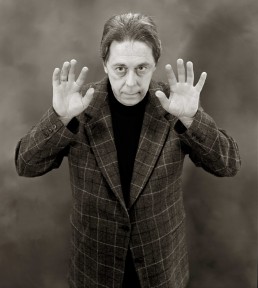S3: Fine Line - Episode 29 - Michael H

Episode Information
Narrator: Welcome to Season three Fine Line narrative histories about mental health and mental illness, a traveling exhibition and weekly podcast edited and hosted by Michael Nye, supported by Kronkosky Charitable Foundation. May you find insight and understanding in these voices. Episode 29, Michael H.
Michael H.: Never thought I’d ever, ever say that I have mental illness, never in my life as I was growing up, I never thought that that would ever happen. I I never gave it any thought, really. Um, maybe thought it happened to, uh, to those people, whoever those people were. Come to find out, I’m one of those people always had a talent for making people laugh. It was, it was like having a, you know, magic wand, you know? Uh, it was really cool. You didn’t have to have big muscles. You didn’t have to hit the ball the farthest, uh, but yet you could, uh, get a positive reaction. I guess most people saw me as outgoing, funny, you know, athletic. I was always popular in high school. I was a, a senior class vice president, that kind of thing. That’s what people saw. That’s not necessarily what I was, but that’s what people saw inside.
I was scared to death. I was unsure. You know, I was, I was faking it. I was just faking. I felt like an actor all the time. Maybe about five years ago. I was sitting in my office at the current, I looked up at the screen on my computer, and I realized I had been reading the same sentence for about an hour, and I realized that tears were running down my face, and I had no idea why they were running down my face. So I called one of the writers and asked them to come in and, can you take me home? I can’t drive. Tried to kind of hide my face as we walked out. And he took me home and I sat on my couch and I couldn’t stop crying. My mother, my mother was ill with cancer. I know, I know. I was sad about that, but I just could not stop crying. That’s when I knew something was definitely wrong with me.
My diagnosis now is schizoaffective disorder. Um, I have certain aspects of schizophrenia and, uh, first diagnosis, um, uh, major depression. My wife and my wife at first did not want to accept the mental illness label. It was hard for her. When I sat down and talked to her finally about, I’m mentally ill, she accepted it finally. But I mean, ’cause she loves me so much and has such hopes that she wants me to be cured. I honest, honestly thought that I was losing my mind, that that madness had descendant upon me, and that, uh, you know, I would soon be just a babbling crazy person in a, in a, in a, in an asylum. I, I honestly thought that. So, yeah, having a label or something put on it, it may sound trite, but it’s, it, it, it, it helped me. It helped to know that, hey, there’s other people that have had this and, and, uh, that you know, that, that it can be treated. The advancement in medications certainly gives me hope. Uh, it seems like every few months, any medication is coming out. So, uh, that, that certainly gives me hope.
[Outro Music]
Host: Every story carries a point of view, and the simple awareness of it is enough to make it rare and valuable. Stories are often found rusting along the edges of surprise and revelation. Listening to others has the capacity to illuminate and liberate our lives, reminding us what we already know, but to make it clear, to find relevance, removing the boundaries between ourselves and others. Michael was the editor, part owner of the San Antonio current newspaper. He was vice president of his high school class. His gift, he said, is making people laugh. Deeply personal stories can take us inside complicated issues where empathy and understanding began. Thank you, Michael, for your courage, your wisdom, your grace, and your presence. May something in Michael’s story stay with you. I’m Michael Nye. You can go to my website michaelnye.org/podcast for Michael’s portrait and transcript. Thank you for listening.
